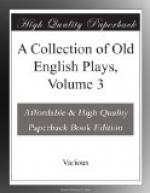Bus. Shunne not hys syghte that dothe
adore your syghte.
How fares the Empresse? Like to a bloweinge rose
Nypt with a colde frost, will she styll keepe in
Cyrckled with ice?
Ber. I knowe not nor I care not.
Bus. But you can guesse.—Or in the frosts Dyspighte Will she blowe out?
Ber. Sir, y’are unmannerlie To stay and question me: I must be gone.
Bus. Take my harte with you.
Ber. He whose harte and tonge Runne one selfe course shall seldome fynde the way To a preferrment.
Bus. Sfoote, doe you thynke your love Such a preferrment? nay then, fare you well.
Ber. Vyllanous man! [Ex. Bertha.
Bus. Well, now unto my father whom I knowe
Hates me but for my goodnes; and althoughe
I cannot blame the Empresse, yet on hym
Ile vent myne honest spleene, and he shall knowe
Vertue at porest hath yet one advocate,
Though muche too meane to helpe her.—See,
a comes.
Enter Ganelon.
Gan. The Empresse and younge Richard
are in league,
Arme knytt and harte knytt with the fervencye
That no joy can exceede. Heaven blesse the mixture!
—But stay; whose thys? O my curyous
sonne,
What newse with you, Sir?
Bus. Sir, though your emynence may guyld
your vyce
And greatnes make your ills seeme gloryous
To some too farre beneathe you, that neare looke
Into the chynckes and crannyes of the state,
Yet, Sir, with reverence, knowe you have doone ill
To crosse Orlandos fayre successyon
By thys unequall maryadge.
Gan. Arte growne madd?
Thoughe I neare knew thee muche opprest with witt,
I did not thynke thee such a foe to sence
To speake with suche a daringe impudence.
Bus. Howe’s that?
Gan. Thus and observe me. As you
love the cubboarde
Wherein your calves brayns are lockt up for breakfast,
Whenere agayne thou shalt but dare to play
The dogge and open thus when I am present
Without my spetyall lycence and comand,
Ile vexe thee so with punishment and shame
That life shalbe thy torment. Hence, thou slave,
Of no more shyrtts, than soules, and they consistinge
Of equall foulness! hence, I say! Ignorance
Shall not excuse thee thus agayne offendinge.
Bus. Preposterous! I walke for want
of spyrrytt.
[Exit
La Busse.
Gan. Pyttie of follye! wherefore shoulde
thys boy,
Thys thynge of too nyce contyence, nay my sonne,
Troble hym selfe with any acte of myne
As if they helde proportion with hys state,
Wytt or condytion? Such thyngs are swayd by chaunce:
And naughts more arrogant than Ignorance.—
But here comes he that hathe brayne to plott
And spyrrytt to acte.




